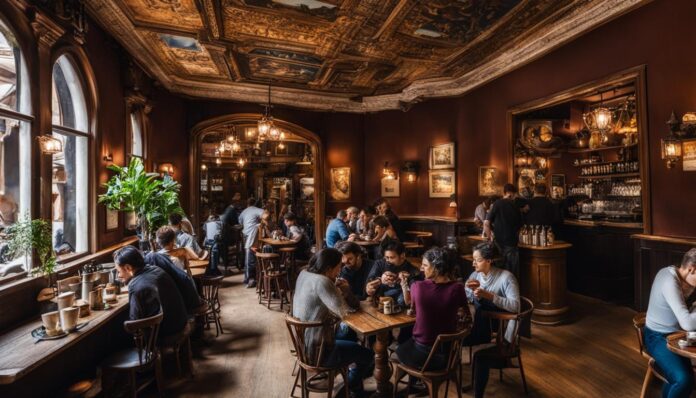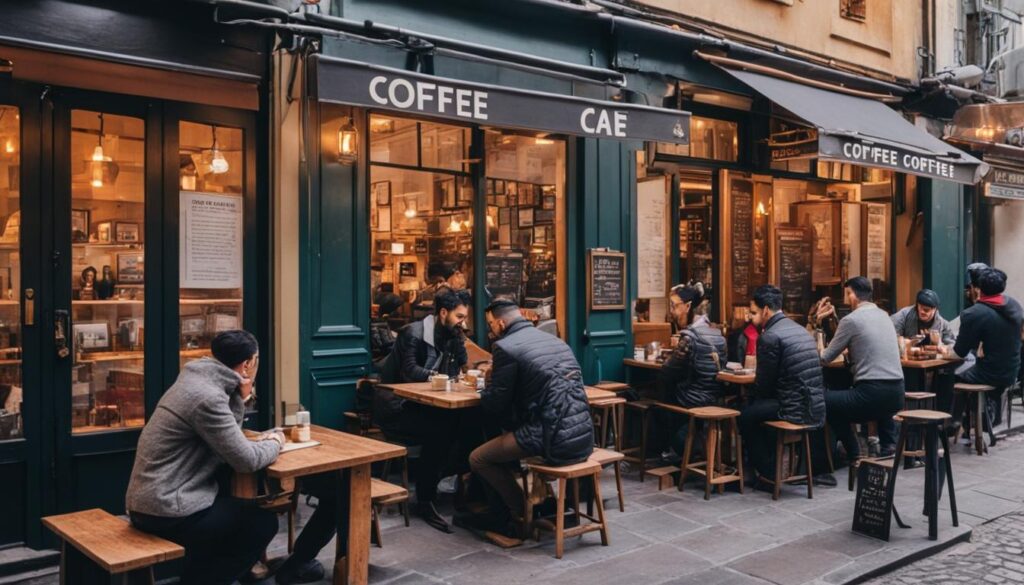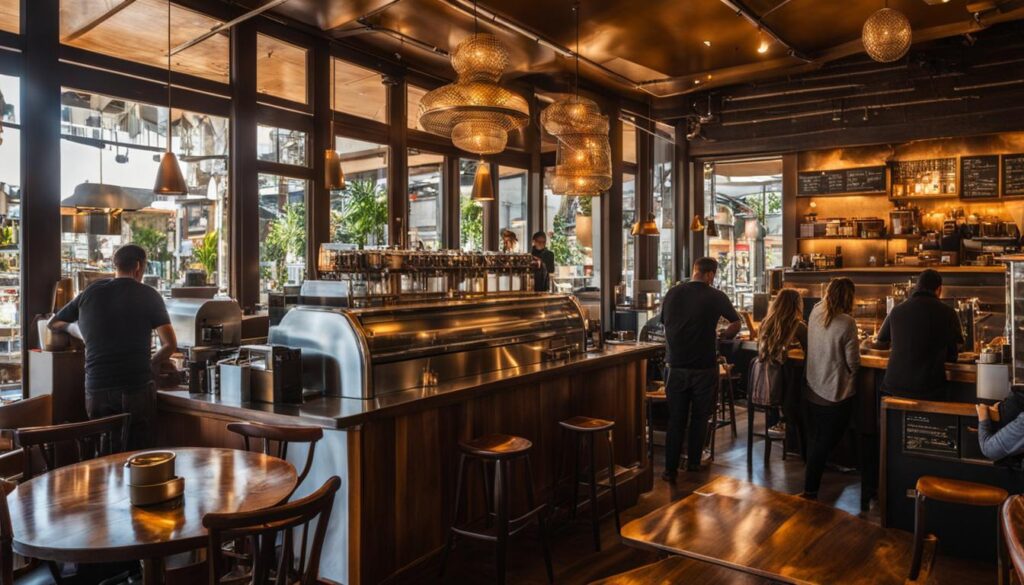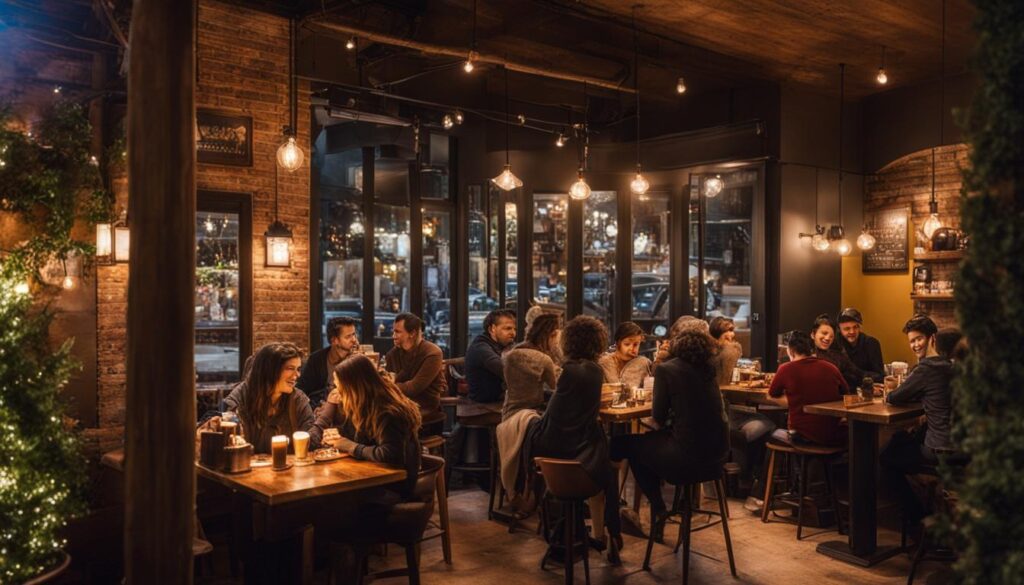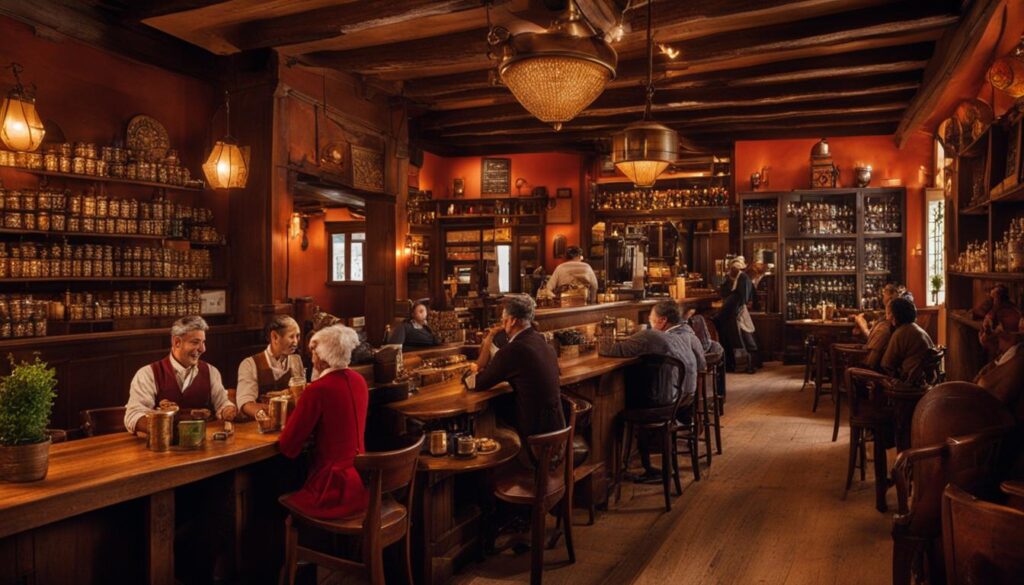Are you a coffee enthusiast looking to experience the authentic flavors of traditional coffee culture? Look no further than your local cafes. Coffee traditions have played a significant role in shaping cafe culture, and local establishments are the best places to explore traditional coffee experiences.
From the neighborhood cafes of New York to the bustling coffee scene of San Francisco, local cafes offer a window into the rich and diverse world of coffee culture. At these cafes, you can engage in coffee culture exploration, connect with the community, and savor the flavors of local coffee scenes.
Join us as we delve into the world of traditional coffee culture and discover the welcoming neighborhood cafes that embody its spirit. Learn about the origins of coffee traditions, the art of coffee making, and the role of cafes in preserving heritage and tradition. Get ready for a journey of coffee culture discovery that will leave you with a newfound appreciation for traditional coffee experiences.
The Origins of Traditional Coffee Culture
Traditional coffee culture has a rich history that began in Ethiopia in the 11th century. Legend has it that a goat herder named Kaldi observed his goats becoming energetic after eating the cherries of a particular bush. Intrigued, he tried the cherries himself and discovered their stimulating effects.
From Ethiopia, coffee spread to the Arab world, where it became an integral part of their culture, particularly in Yemen. By the 15th century, coffee had reached Turkey, where it gained popularity among the ruling elite, leading to the establishment of coffeehouses.
As coffee made its way to Europe in the 17th century, it was initially met with skepticism but eventually gained widespread popularity. Coffeehouses became key gathering places for intellectuals, artists, and political figures, leading to the emergence of coffeehouse culture.
The diverse cultural traditions surrounding coffee have continued to evolve over time, with unique practices developing in different regions worldwide. These traditions have played a crucial role in shaping contemporary cafe culture, with local cafes around the world proudly showcasing their unique offerings and traditional coffee experiences to visitors.
Embracing Cafe Culture
Cafe culture is an essential component of local communities, where neighborhood cafes and coffee shops serve as social hubs for residents and visitors alike. These gathering places offer a unique ambiance and an opportunity to enjoy your favorite brew while engaging in conversations with your neighbors, friends, or colleagues.
The importance of local cafes in fostering a sense of community cannot be overstated. These establishments provide a space where people can come together, share their stories, and establish meaningful connections. The distinct charm and character of neighborhood cafes also make them a popular destination for tourists and travelers seeking an authentic local experience.
Whether you are looking for a place to work remotely, catch up with friends, or unwind with a good book, there is a cafe or coffee shop in your neighborhood that can cater to your needs. With their unique atmosphere and cultural significance, local cafes offer more than just a cup of coffee – they offer an opportunity to embrace the cafe culture and immerse yourself in the local community.
The Art of Coffee Making
At local cafes, coffee-making is an art that requires immense skill and craftsmanship. From selecting the right beans to brewing the perfect cup, every step in the process is critical to creating a traditional coffee experience for customers.
One of the key elements of traditional coffee culture is the adherence to specific brewing techniques. Local cafes often follow tried-and-true methods that have been passed down through generations. Whether it’s the pour-over method or the French press, each brewing technique has its own unique characteristics that contribute to the flavor and aroma of the final product.
In addition to brewing techniques, the quality of the beans used is equally important in creating authentic coffee experiences. Local cafes often source their beans from small-batch roasters, ensuring that the coffee is not only fresh but also of the highest quality.
By prioritizing the craftsmanship of coffee-making and the selection of high-quality beans, local cafes uphold the essential aspects of traditional coffee culture. Their dedication to preserving these practices ensures that customers can have a genuine coffee experience that reflects the rich heritage and traditions of cafe culture.
Exploring Local Coffee Scenes
As you travel around the country, you’ll find that the local coffee scene varies from region to region. Each area has its own unique coffee traditions, and local cafes often play a central role in showcasing those traditions.
In Portland, Oregon, for example, you’ll find a thriving coffee culture with a focus on sustainability and ethically sourced beans. Local cafes like Stumptown Coffee Roasters and Coava Coffee Roasters are noted for their commitment to quality and environmental responsibility.
Meanwhile, in New Orleans, coffee is more than just a beverage – it’s a way of life. The city’s famous chicory coffee, served at cafes like Cafe Du Monde and Morning Call, has been a tradition since the Civil War era.
When you explore the local coffee scene in your area, you’ll discover a world of traditional coffee experiences that you won’t find anywhere else. Whether it’s a cup of cortado at a neighborhood cafe or a pour-over at a trendy coffee shop, the diversity of local cafes provides endless opportunities to explore and savor the unique flavors of traditional coffee culture.
“The local coffee scene is an ever-evolving landscape, with new cafes opening up all the time. Each one has its own story to tell and its own take on traditional coffee culture. It’s an exciting time for coffee enthusiasts!”
Community and Connection
Local cafes have always been more than just places to grab a quick cup of coffee. They’re social hubs where people come to connect with others. Neighborhood cafes are particularly valuable, as they serve as gathering places for people within the immediate community.
More than just a place to get your caffeine fix, locally-owned cafes provide a sense of warmth and familiarity that is hard to replicate in larger chain coffee shops. Regular patrons and staff often develop close relationships, with baristas often becoming an integral part of the community.
Sharing a coffee table with others can foster a sense of belonging and a chance to share stories and ideas. Whether you’re meeting with friends, studying, or simply people-watching with a hot mug of coffee, community and connection are at the heart of the cafe experience.
Cafes can also bridge the gap between different groups and minorities, creating an inclusive environment where everyone is welcome. Whether you’re catching up with an old friend or meeting someone new, the community-oriented atmosphere of local cafes is truly unmatched.
Preserving Heritage and Tradition
As coffee culture continues to evolve, it’s important to preserve the rich traditions and heritage that define it. This is where local cafes play a crucial role in keeping traditional coffee practices alive and passing them down to future generations. By prioritizing high-quality, authentic coffee experiences, these cafes contribute to the authenticity and diversity of cafe culture as a whole.
From sourcing the highest quality beans to mastering traditional brewing techniques, local coffee shops are committed to preserving the essence of traditional coffee culture. They serve as the guardians of time-honored practices and help to ensure that these practices are not lost or forgotten. This dedication to preserving heritage and tradition creates a unique experience that is unmatched by larger chain coffee shops.
The efforts of coffee enthusiasts and industry professionals in preserving traditional coffee culture are truly inspiring. By sharing their knowledge and passion for coffee, they help to keep these practices alive and flourishing. A commitment to tradition and heritage is what sets local cafes apart from the rest and helps to keep the coffee culture exploration alive.
“By prioritizing high-quality, authentic coffee experiences, local cafes contribute to the authenticity and diversity of cafe culture as a whole.”
Supporting Local Coffee Businesses
Investing in your local coffee scene offers more than just a delicious cup of coffee. It contributes to the growth and sustainability of traditional coffee culture, supporting the neighborhood cafes and coffee shops that make it all possible.
By visiting local cafes instead of chain coffee shops, you’re not only choosing high-quality, unique coffee experiences, but you’re also supporting the community around you. Local cafes often source their beans from nearby farms, promoting local agriculture and the economy.
Additionally, local cafes are often run by small business owners who pour their hearts and souls into creating a unique atmosphere and exceptional customer service. By investing in these businesses, you’re helping them continue to thrive and create the neighborhood gathering spaces that are essential to the coffee scene.
So next time you’re in the mood for a cup of coffee, consider trying out a neighborhood cafe or locally owned coffee shop. It might just become your new favorite spot, and you’ll be supporting your local community in the process.
Conclusion
Congratulations! You have explored the rich and diverse world of traditional coffee culture and local cafes. Through this coffee culture exploration, you have gained a deeper understanding of the significance of coffee traditions and the role they play in creating a unique cafe culture. You have learned about the importance of local cafes in showcasing traditional coffee experiences and fostering a sense of community in neighborhoods.
As you continue to embrace cafe culture, you can appreciate the craft and skill that goes into making a perfect cup of coffee. You can explore the local coffee scene in your area and discover the unique characteristics and offerings of each neighborhood cafe.
By supporting local coffee businesses, you can contribute to the growth and sustainability of traditional coffee culture. You can help preserve the rich cultural heritage associated with coffee and keep traditional coffee practices alive for future generations.
So go ahead, grab a cup of coffee from your favorite local cafe, and savor the traditional coffee experiences and community connections that come with it!




























